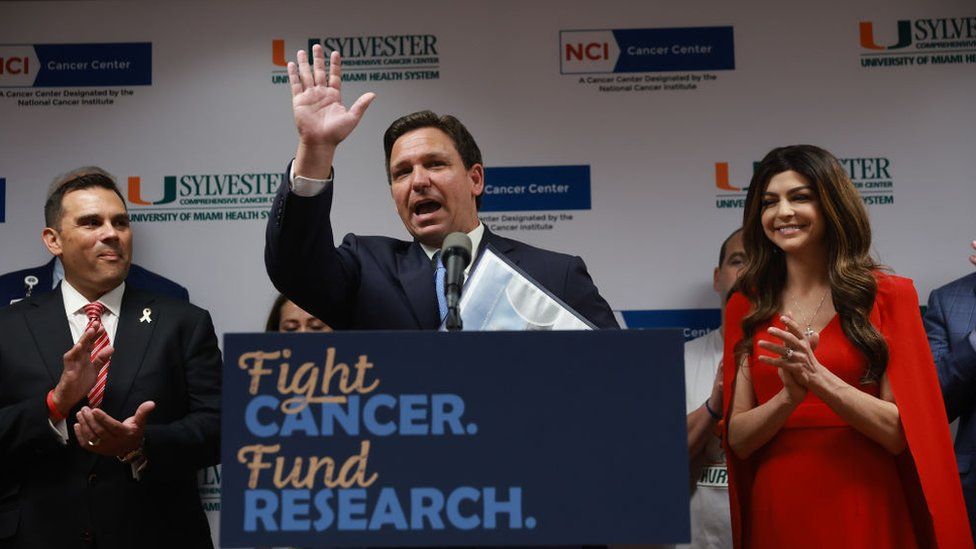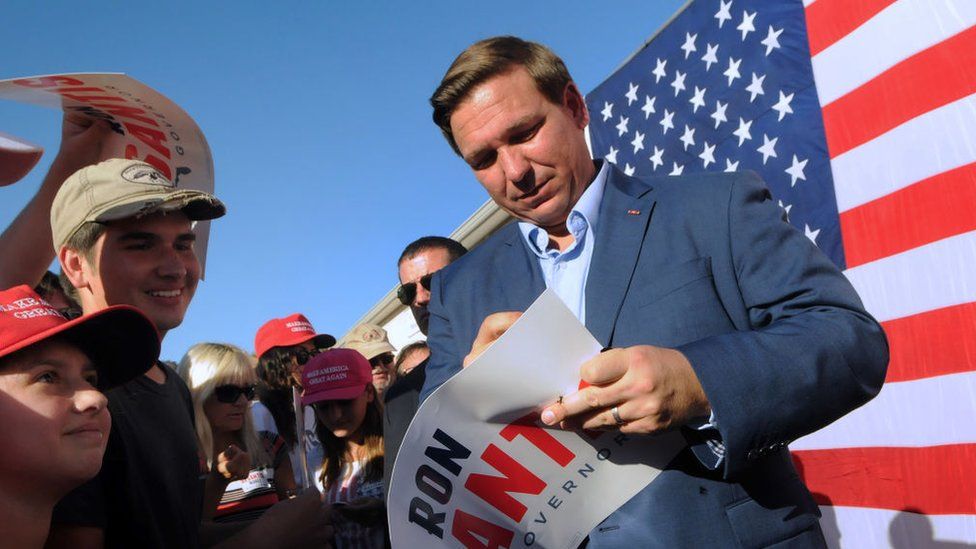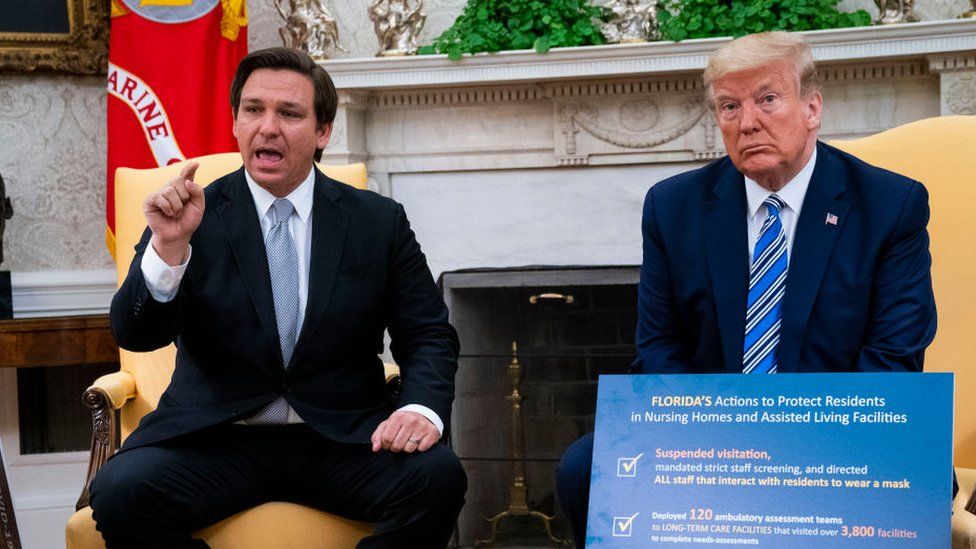When Florida Governor Ron DeSantis strolled up to the podium on a sunny day in early October, he didn’t look the part of a man standing just feet from the shattered remnants of boats and properties left ruined by Hurricane Ian in Fort Myers Beach. Dressed in finely pressed grey trousers and a blazer, he looked more ready to take on a day at his office in the state capital of Tallahassee hundreds of miles away.
The scene was made stranger by the sight of the man standing a few steps over his right shoulder: US President Joe Biden, a political rival with whom he has clashed on everything from Covid-19 restrictions and LGBT rights to “woke” education and border security.
“Mr President, welcome to Florida,” Mr DeSantis said after a warm embrace. “We appreciate working together across various levels of government.”
This willingness to work with rivals – as well as his serious demeanour and bearing – have prompted some journalists and Republican observers to refer to Mr DeSantis as “Trump with substance” or “Trump 2.0”.
“Trump was never about policy. He was all about attitude,” former Republican National Committee spokesman Doug Heye told the BBC. “DeSantis certainly engages in Trump tactics, but there’s both political and policy goals in mind behind them.”
It’s an image that appeals to many voters in the Sunshine State.
With just weeks to go until the November midterm election, polls show Mr DeSantis with a comfortable lead against Charlie Crist, the Democrat he is facing in Florida’s gubernatorial race.
Here’s a deeper look at the man some believe is the new face of the Republican Party and, potentially, the next Republican president in the White House.
From Yale to the governor’s office
At 44 years old, Mr DeSantis is still a relative newcomer to US politics, having first been elected to the House of Representatives in 2012. Just six years later in 2018 – after a short-lived bid to become a senator – he became governor.
Born in Jacksonville, Florida, in 1978, Mr DeSantis went on to study history at Yale University – where he was captain of the baseball team – and soon after to Harvard Law School.
During his second year at Harvard, he was commissioned as an officer in the US Navy and was assigned to its legal arm, the Judge Advocate General’s (JAG) Corps. His service as a JAG officer included working with detainees held in Guantanamo Bay, as well as an assignment as a legal adviser for elite US Navy Seals deployed to Iraq.
Mr DeSantis was honourably discharged from the military in 2010, although he continues to serve in the US Navy reserve. It was also around this time that he met his wife, Casey, a local TV news reporter and cancer survivor who helped spearhead fundraising in the wake of 2022’s Hurricane Ian.

The New Yorker later described the couple and their children as “ready made for a campaign brochure”, and quoted one colleague of Mr DeSantis as saying they “look like they’re from central casting”.
After his active duty service ended, Mr DeSantis became a federal prosecutor. Then in 2012 he entered a race for a seat in Florida’s Sixth Congressional District, one of the most conservative in the state.
During this initial foray into Florida politics, Mr DeSantis largely campaigned on a platform of “small government” and reduced taxes – as well as a pronounced opposition to the Obama administration. He condemned what he deemed the government’s tendency to intervene on “virtually any issue, from the waistline of children to the temperature of earth”.
“My mission was largely to stop Barack Obama,” he recalled in a February speech at a conservative conference in Texas. “Those were good fights. Important fights.”

In 2018, after five years on Capitol Hill – where he helped found the “Freedom Caucus” of hard-right conservatives – Mr DeSantis announced his intention to run for governor, with the full endorsement of then-President Donald Trump.
Mr Trump’s influence over the DeSantis campaign was quickly and abundantly clear.
In one memorable campaign ad, Mr DeSantis is seen telling one of his children to “build the wall” while playing with blocks, teaching another to read with a “Make America Great Again” sign, and reading to his son Mason. “Then Mr Trump said ‘you’re fired!’ – I love that part,” he says.
The New Yorker later quoted Kevin Cate, a media consultant for Mr DeSantis’ opponent, as saying that the 30-second commercial was “the dumbest, most effective ad in Florida history”.
He was sworn in as governor in January 2019.
DeSantis as governor
Mr DeSantis’ first major challenge as governor came in 2020, amid the Covid-19 pandemic. By April, he’d ordered a state-wide lockdown, set up hundreds of test centres and ordered millions of masks – which he publicly said “could potentially ward off infections for the most vulnerable”.
By April 2020, however, Mr DeSantis had begun lifting the state’s restrictions and by July – despite skyrocketing cases and scathing criticism – ordered that schools be reopened.
“Covid is really where he made his name, in being someone who was sort of bucking the national wisdom at the time,” Sarah Longwell, a Republican strategist and founder of Republican Voters Against Trump, told the BBC. “There’s a lot of people in the state who appreciated his position.”
At the same time, he was being nationally televised on Fox News, through which he took aim at President Joe Biden after he was sworn in to the White House in January 2021.
“The contrast between a doddering, quasi-senile President who has to have his press team clean up his remarks after every time he opens his mouth, versus somebody like me who’s out there, I am very direct,” he said in a March TV appearance. “I say what I mean. I mean what I say. I lead, and I get things done.”

The things he’s “got done” since then have propelled him to a position as one of the country’s most recognisable Republican figures. In March 2022, for example, he signed a bill – which activists dubbed “Don’t Say Gay” – that banned discussions of sexual orientation or gender identity in primary schools.
He also established an “Office of Election Crimes and Security” in 2022 to look into alleged voting crimes. Some people with past felony convictions were arrested for alleged voter fraud, but expressed confusion, saying they had been told they were eligible to vote and sent registration cards by local officials.
After the US Supreme Court removed the constitutional right to abortion, Mr DeSantis declared that “the prayers of millions” had been answered. Since then he has been less vocal on the issue, which some have speculated is a political calculation aimed at balancing pressure from conservative elements in the Republican Party with the views of Florida voters, a majority of whom are pro-choice.
A law signed by the governor that banned abortions after the 15-week mark drew legal challenges, and is now being dealt with by the state’s supreme court.
Critics recently accused Mr DeSantis of “weaponising” migrants as part of a political stunt, when he arranged for a group of mostly Venezuelan asylum seekers to be flown from Texas to Martha’s Vineyard, a liberal enclave in Massachusetts.
“That [the migrants] was again him very proactively inserting himself into a culture war,” Mr Heye said. “He’s willing to play the role culture warrior in chief.”
Ms Longwell said that Mr DeSantis’ battles with the media around his more controversial policies may ultimately be what is propelling him to political stardom.
“People make a lot of who Ron DeSantis hates, but one of his biggest assets is who hates him,” she said. “The media finds him appalling, and he loves that. That’s another thing he learned from Trump. If you outrage the media, they talk about you a lot, and that boosts your name ID and helps you with fans and loyalists.”
The heir apparent?
So far, Mr DeSantis has not announced any intention to run for president in 2024 and said he’s only focused on the 2022 Florida race. Still, speculation is swirling that he may be the leading Republican candidate should Mr Trump not run again, or potentially even if he does.
Some polls show Mr DeSantis now ahead of Mr Trump in Florida opinion polls on a potential 2024 showdown, and in a tight race with him nationally.

Ms Longwell, who conducts frequent focus groups with Trump 2020 voters, said that Mr DeSantis is “far and away the number one name that comes up” when participants are asked who’d they’d like to see run if Mr Trump isn’t in the race.
While she believes he is “positioning himself” for the possibility in that scenario, it “remains unclear” whether he’d be able to beat Mr Trump to the nomination.
“I’m not sure if DeSantis has the juice or the ability to take on Trump one-on-one,” she said. “There’s a lot of people talking about him as the future of the Republican Party. But it’s too soon to predict that – we’ve never seen this guy operate on a national stage.”
